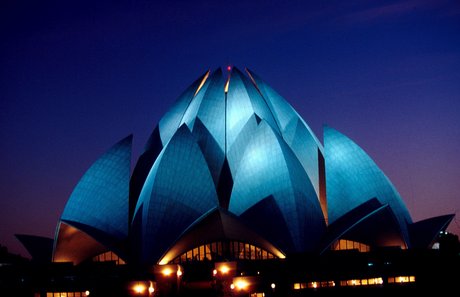Will Earth Hour have been the biggest collective act in the history of mankind to date? Presaging that glorious day when the human race will have become as "one soul and one body"? Focus quotation:Excerpt from AP article:"Earth Hour has always been a positive campaign; it's always around street parties, not street protests, it's the idea of hope, not despair. And I think that's something that's been incredibly important this year because there is so much despair around," said Earth Hour executive director Andy Ridley.

Photo: Russian students stand with candles in the city centre of VLADIVOSTOK as they mark WWF's Earth Hour
Source: news.yahoo.com By VANESSA GERA, Associated Press Writer Vanessa Gera, Associated Press Writer 28 March
BONN, Germany – From an Antarctic research base to the Great Pyramids of Egypt and beyond, the world switched off the lights on Saturday for the second Earth Hour, dimming skyscrapers, city streets and some of the world's most recognizable monuments for 60 minutes to highlight the threat of climate change.
Time zone by time zone, nearly 4,000 cities and towns in 88 countries joined the event sponsored by the World Wildlife Fund to dim nonessential lights from 8:30 p.m. to 9:30 p.m.
An agreement to replace Kyoto Protocol, which expires in 2012, is supposed to be reached in Copenhagen, Denmark, this December, and environmentalists' sense of urgency has spurred interest in this year's Earth Hour. Last year, only 400 cities participated; Sydney held a solo event in 2007.
Organizers initially worried enthusiasm this year would wane with the world focused on the global economic crisis, Earth Hour executive director Andy Ridley told The Associated Press. But he said it apparently had the opposite effect.
"Earth Hour has always been a positive campaign; it's always around street parties, not street protests, it's the idea of hope, not despair. And I think that's something that's been incredibly important this year because there is so much despair around," he said. "On the other side of it, there's savings in cutting your power usage and being more sustainable and more efficient."
The Chatham Islands, a small chain about 500 miles (800 kilometers) east of New Zealand, switched off its diesel generators to officially begin Earth Hour. Soon after, the lights of Auckland's Sky Tower, the tallest man-made structure in New Zealand, blinked off.
At Scott Base in Antarctica, New Zealand's 26-member winter team resorted to minimum safety lighting and switched off appliances and computers.
In Australia, people attended candlelit speed-dating events and gathered at outdoor concerts as the hour of darkness rolled through. Sydney's glittering harbor was bathed in shadows as lights dimmed on the steel arch of the city's iconic Harbour Bridge and the nearby Opera House.
And in Egypt, the Great Pyramids darkened, as did the Sphinx.
In Bonn, WWF activists planned a candlelit cocktail party on the eve of a U.N. climate change meeting, the first in a series of talks this year seeking a new deal to curb emissions of heat-trapping gases that scientists say are dangerously warming the planet.
As nightfall approached in Europe, Paris planned to darken more than 200 monuments and buildings, including the Louvre and Notre Dame Cathedral.
The Eiffel Tower will extinguish its lights for only five minutes for security reasons because visitors will be on the tower, said WWF France spokesman Pierre Chasseray. But a nightly 9 p.m. sparkling lights feature will not run.
"Above all in the current economic crisis, we should send a signal for climate protection," said Klaus Wowereit, the mayor of Berlin, one in a handful of German cities switching off lights for Earth Day for the first time.
In Switzerland, the city of Geneva plans to switch off the lights on its theaters, churches and monuments. Among these are the Reformation Wall, where floodlights normally illuminate 10-foot (three-meter) statues of John Calvin and other leaders of Protestantism. The city's motto engraved on either side of the statues is: "After darkness, light."
Romania planned to turn off lights at the massive palace built in Bucharest by the late dictator Nicolae Ceausescu.
Still, a key 2010 football World Cup qualifier against Serbia posed a dilemma for Romanians. "Shall we watch the match or turn off the lights?," the 7plus daily asked in its main front-page headline.
The U.N. headquarters in New York and other facilities were dimming their lights to signal the need for global support for a new climate treaty.
U.N. Secretary Ban Ki-moon called Earth Hour "a way for the citizens of the world to send a clear message: They want action on climate change."
China participated for the first time, cutting the lights at Beijing's Bird's Nest Stadium and Water Cube, the most prominent 2008 Olympic venues. Shanghai cut lights at all government buildings and other structures on its waterfront, while Hong Kong, Baoding, Changchun, Dalian, Nanjing and Guangzhou also took part.
In Bangkok, the prime minister switched off the lights on Khao San Road, a haven for budget travelers packed with bars and outdoor cafes. On Bangkok's bustling Silom Road, street vendors hawking pirated DVDs and T-shirts chipped in by turning off the bulbs that light their stalls.
Earth Hour organizers say there's no uniform way to measure how much energy is saved worldwide.
Earth Hour 2009 has garnered support from global corporations, nonprofit groups, schools, scientists and celebrities — including Oscar-winning actress Cate Blanchett and retired Cape Town Archbishop Desmond Tutu.
McDonald's Corp. planned to dim its arches at 500 locations around the U.S. Midwest. The Marriott, Ritz-Carlton and Fairmont hotel chains and Coca-Cola Co. also planned to participate.
Source:
http://news.yahoo.com/s/ap/20090328/ap_on_re_as/earth_hour Omniscient, the Bountiful.







